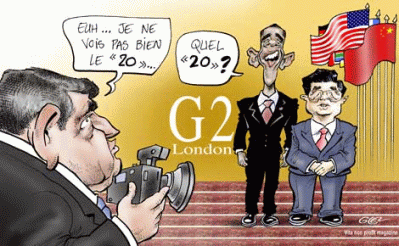
Presidents Obama and Hu (cartoon). Source: Google Images
President Obama did a good job this week in China. Goodwill is a valuable intangible in politics, and he engendered some on his Asian trip. Still, the gloss is off the family car — the superpower with hat in hand is an oxymoron. The spectacle of the United States having to go to Beijing to explain health care reform, the biggest expansion of American entitlement spending in years undertaken in a year when government debt is skyrocketing, reminds one of Jimmy Carter’s infamous “Carter bonds.” This embarrassing episode in U.S. economic history occurred in 1979, when U.S. government bonds were to be issued in deutchemarks in order to shore up the sagging U.S. dollar.
C’mon, America, you can do better than that!
Instead of having to explain America’s faltering public finances to our Chinese bankers, the administration should be planning a medium-term deficit and debt reduction strategy. The financial relationship with China echoes too much of the relationship in years past between the IMF and the likes of Argentina and Turkey, Mexico and the Ukraine, periodically having to explain their messy public books.
The NYTimes reported this week that the Chinese grilled the president’s budget director, Peter Orszag, on health care reform — not on the public option, not on universal coverage, but on its impact on the budget deficit. These are the kinds of questions the IMF asks countries with serious fiscal problems.
President Obama is impressive on the world stage. He did well in China this week, as he has done giving speeches across the globe. On Iran, the impressive stance his administration has taken — tough, though measured, and thus far, persistent (see NYTimes article) — is to be praised. He emphasized this issue with the Chinese this week as well. But, let us not forget the view of international relations “realists,” that relative power remains the foundation of a country’s security, and in the case of a superpower such as the U.S., the pillars upon which important global institutions rest (the U.N., the IMF, the WTO, the World Bank, NATO, the G-20, etc.). America should stick to its knitting, by enhancing internal sources of power — a strong economy, sound public finances, a sound currency, a healthy banking system — as a counterpart to external sources of power — good relations with other great powers, alliances.
It is understandable that the Democrats would undertake an expensive health care reform this year. They want this legislation. It has its merits in terms of fairness in our society. They have the majorities in Congress and control over two branches of government. If they don’t do it now, they may miss the opportunity, when the Republicans have their inevitable electoral surge. Witness the losses of two governers’ mansions this month in New Jersey and Virginia, despite the president’s active campaigning. So, health care reform now is understandable from a political perspective. It just remains fiscally irresponsible, as government debt moves toward 90% of GDP.
Granted, a fiscal tightening right now would be premature, would take away the only stimulus active in the U.S. economy. But, a plan, a program, to restore fiscal health — in a word, credibility — would reassure not only America’s foreign investors, but Americans themselves, uneasy over the management of the economy.
This was the 800-pound gorilla in the Forbidden City this week. Sure, staunching a trade war between the U.S. and China is arguably as important as improving America’s finances. Sure, working diligently on climate change is probably the issue most critical to our planet in the long run. And, cooperating on policy toward Iran and North Korea is a very high priority, as is human rights, a cornerstone of America’s mission in the world. Nevertheless, all of these issues can be advanced more effectively by a United States more in control of its destiny.